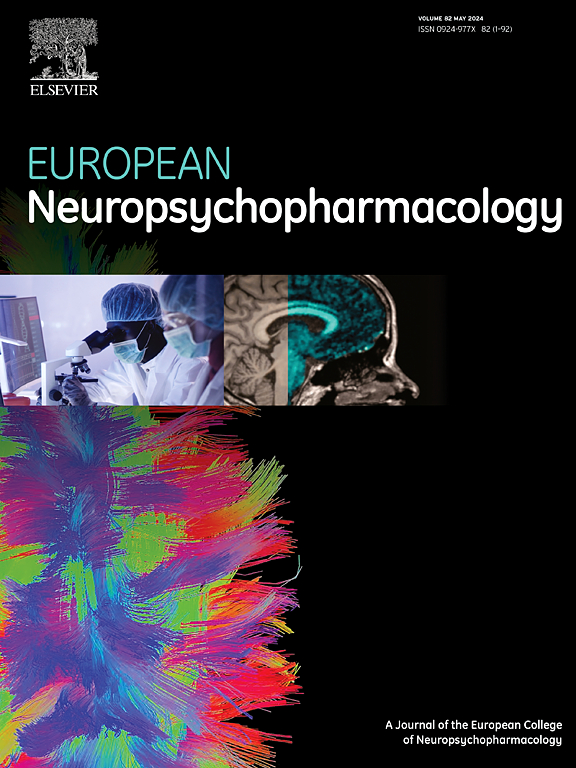难治性抑郁症的遗传基础:来自精神病协会的见解
IF 6.7
2区 医学
Q1 CLINICAL NEUROLOGY
引用次数: 0
摘要
重度抑郁障碍(MDD)的抑郁症状主要用抗抑郁药物治疗。然而,即使经过多次药物试验,仍有相当比例的患者没有取得有意义的症状改善,这对临床和公共卫生构成了重大挑战。研究难治性抑郁症(TRD)的遗传基础可能潜在地揭示导致治疗效果不佳的生物成分。通过PsychSTRATA联盟,我们的目标是研究主要精神疾病治疗耐药的生物学基础,包括重度抑郁症、双相情感障碍和精神分裂症。在这项研究中,我们通过对患有和不患有TRD的个体进行全基因组关联研究,特别关注MDD中TRD的遗传基础。我们与许多国际站点和PGC抗抑郁药工作组合作,使用电子医疗记录(EHR)、结构化临床访谈和自我报告问卷,整理和协调了来自临床研究、大型生物库和基于人群的队列的数据,以定义TRD。目前正在进行分析,并利用来自约265,000名重度抑郁症患者的数据,其中约39,500人被归类为TRD,约225,500人被归类为非TRD。计划的分析包括GWAS荟萃分析,基于snp的遗传力估计,多基因风险评分,以及跨定义的比较,以表征TRD的遗传结构并验证遗传发现。我们的研究结果将有助于提高对TRD的药物遗传机制的理解,并有助于确定双相情感障碍和精神分裂症的疾病特异性和共享遗传贡献。最终,这可能会为有治疗耐药性的个体提供有针对性的或新的药理学策略。本文章由计算机程序翻译,如有差异,请以英文原文为准。
GENETIC UNDERPINNINGS OF TREATMENT-RESISTANT DEPRESSION: INSIGHTS FROM THE PSYCHSTRATA CONSORTIUM
Depressive Symptoms in Major Depressive Disorder (MDD) are primarily treated with antidepressant medication. However, a substantial proportion of patients do not achieve a meaningful symptom improvement, even after multiple medication trials, posing a major clinical and public health challenge. Investigating the genetic underpinnings of treatment-resistant depression (TRD) may potentially reveal biological components that contribute to poor treatment outcomes.
Through the PsychSTRATA consortium, we aim to investigate the biological basis of treatment resistance across major psychiatric disorders, including MDD, bipolar disorder, and schizophrenia. In this study, we focus specifically on the genetic basis of TRD within MDD by performing a genome-wide associations study comparing individuals with and without TRD. In collaboration with many international sites and the antidepressant working group of the PGC, we collated and harmonized data from clinical studies, large-scale biobanks, and population-based cohorts, using electronic healthcare records (EHR), structured clinical interviews, and self-report questionnaires to define TRD.
Analyses are currently ongoing and leverage data from ∼265,000 individuals with MDD, of whom ∼39,500 were classified as TRD and ∼225,500 as non-TRD. Planned analyses include a GWAS meta-analysis, SNP-based heritability estimation, polygenic risk scoring, and comparisons across definitions to characterize the genetic architecture of TRD and validate genetic findings.
Our results will lead to an improved understanding of the pharmacogenetic mechanisms underlying TRD and help to identify both disorder-specific and shared genetic contributions with bipolar disorder and schizophrenia. Ultimately, this may inform the development of targeted or novel pharmacological strategies for individuals with treatment resistance.
求助全文
通过发布文献求助,成功后即可免费获取论文全文。
去求助
来源期刊

European Neuropsychopharmacology
医学-精神病学
CiteScore
10.30
自引率
5.40%
发文量
730
审稿时长
41 days
期刊介绍:
European Neuropsychopharmacology is the official publication of the European College of Neuropsychopharmacology (ECNP). In accordance with the mission of the College, the journal focuses on clinical and basic science contributions that advance our understanding of brain function and human behaviour and enable translation into improved treatments and enhanced public health impact in psychiatry. Recent years have been characterized by exciting advances in basic knowledge and available experimental techniques in neuroscience and genomics. However, clinical translation of these findings has not been as rapid. The journal aims to narrow this gap by promoting findings that are expected to have a major impact on both our understanding of the biological bases of mental disorders and the development and improvement of treatments, ideally paving the way for prevention and recovery.
 求助内容:
求助内容: 应助结果提醒方式:
应助结果提醒方式:


